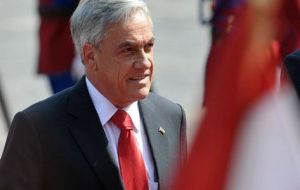MercoPress. South Atlantic News Agency
Lack of political support freezes Chile’s biggest multi-dam project
 President Piñera has seen his support drop to 24% particularly over the unsolved education problem
President Piñera has seen his support drop to 24% particularly over the unsolved education problem Chile’s biggest dam project involving 7 billion dollars and already delayed by protests over plans to flood 14,000 acres of Patagonia wilderness, suffered a fresh setback after one of its investors said the venture lacks political support to proceed.
Santiago-based power company Colbun SA (COLBUN), which holds 49% of 2,750-megawatt HidroAysen project said it wants to indefinitely suspend plans to seek environmental permission to build transmission lines to the capital. Empresa Nacional de Electricidad SA, known as Endesa, a Spanish company owns the remaining 51%.
Colbun, in a statement filed with Chile’s securities regulator, said the country needs broader consensus on its energy policy before HidroAysen can advance. Nationwide protests against the dam, plus delays in other generation projects, have investors concerned.
Colbun said it is open to making changes to HidroAysen’s construction plans and ownership structure. Centrales Hidroelectricas de Aysen SA, the joint venture company developing HidroAysen, will consider Colbun’s recommendations in future meetings, it said in a regulatory filing on Wednesday.
HidroAysen involves building five dams for an estimated 3.2 billion and 1,900 kilometers of transmission line to feed the grid that supplies Santiago as well as copper mines operated by state-owned Codelco and Anglo American Plc.
The Chilean government has been exploring the hydroelectric potential of the Baker and Pascua rivers in the Aysen region since the 1940s. Endesa and Colbun presented the first study on the project in 2007 and won environmental approval last year to build the dams.
Environmentalists including Douglas Tompkins, who walked away from his Esprit Holding Ltd. clothing company and moved two decades ago to Patagonia to buy up land for conservation, say the power lines would scar protected areas that are home to 13 endangered and vulnerable animal species, including the pudu, the world’s smallest deer. Protests against the project last year led to hundreds of arrests and millions of dollars in damage to public property.
Chile which is the world’s top copper producer needs to double its electricity generating capacity as mining companies such as Codelco and BHP Billiton Ltd. plan 100 billion dollars of expansions, according to Chilean mining society Sonami. Codelco and BHP have called on the government to speed up permitting for new power generators.
The government devised a 20-year energy plan earlier this year and is working with Congress to further improve the investment climate, Energy Minister Jorge Bunster wrote in an e- mailed statement following Colbun’s announcement.
The dams together could generate 2.75 gigawatts, nearly a third of central Chile's current capacity, within 12 years. Supporters say its economic benefits justify carving access roads through an area of Andean glaciers and deep green valleys and fjords and running transmission lines through national parks and private properties all the way to Santiago.
With Chile's energy-intensive mining industry clamoring for more power and living standards improving, some analysts say the country must triple its capacity in just 15 years, despite having no domestic oil or natural gas. Chile imports 97% of its fossil fuels and depends largely on hydropower for electricity, creating a crisis when droughts drain reservoirs or far away disputes affect fuel imports.
Government intervention has also dissuaded energy investments. In 2010, President Sebastian Piñera asked GDF Suez (GSZ) SA, Europe’s largest natural-gas network operator, to scrap plans to build a 540-megawatt coal-fired power plant on the coastal site of Barrancones after environmental opposition.
Colbun will wait until President Piñera leaves office in 2014 before trying to build HidroAysen, said Patricio Navia, a Chilean political scientist. The billionaire investor’s approval rating stood at 24% in April, the lowest of any Chilean president since the return of democracy in 1990, as student protests erode support for the government.
“They don’t want their project to go down with Pinera,” Navia, who teaches at New York University, said by phone from Santiago. “Everyone knows that HidroAysen is going to get built eventually. So why not do it when there’s less opposition?”




Top Comments
Disclaimer & comment rules-

-

-

Read all commentsThey will wait until there's a “Socialist” Gov. in power before they go ahead. All the big businesses know that the ignorant majority in Chile will readily let the leftists insert a pineapple sideways up them with a smile. It's just a matter of perception, when the right screws them they go out to on the streets and burn buses and shit, but when the left does it, they smile and take it all the way.
Jun 01st, 2012 - 08:04 am 0That makes them the same as us Argentines!!!!
Jun 01st, 2012 - 01:43 pm 0Momio, “The Chilean perspective” meets Gorila “Simon68”…
Jun 01st, 2012 - 02:01 pm 0What a perfect transnational brotherhood couple…
Both detest the “Disgraceful Ignorant Majority”…
Them being the “Graceful Educated Minority”…
Chuckle chuckle©
Commenting for this story is now closed.
If you have a Facebook account, become a fan and comment on our Facebook Page!